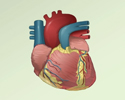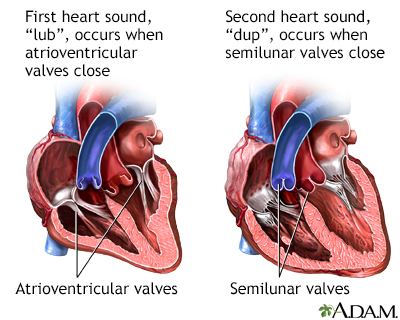Heart palpitations
Palpitations are feelings or sensations that your heart is pounding or racing. They can be felt in your chest, throat, or neck.
You may:
- Have an unpleasant awareness of your own heartbeat
- Feel like your heart skipped or stopped beats
Your heart's rhythm may be normal or abnormal when you have palpitations.
What makes your heart beat? - Animation
The cardiac conduction system is a group of specialized cardiac muscle cells in the walls of the heart that send signals to the heart muscle causing it to contract. The main components of the cardiac conduction system are the SA node, AV node, bundle of His, bundle branches, and Purkinje fibers. The SA node (anatomical pacemaker) starts the sequence by causing the atrial muscles to contract. From there, the signal travels to the AV node, through the bundle of His, down the bundle branches, and through the Purkinje fibers, causing the ventricles to contract. This signal creates an electrical current that can be seen on a graph called an electrocardiogram (EKG or ECG). Doctors use an EKG to monitor the cardiac conduction system's electrical activity in the heart.
Considerations
Normally the heart beats 60 to 100 times per minute. The rate may drop below 60 beats per minute in people who exercise regularly or take medicines that slow the heart.
If your heart rate is fast (over 100 beats per minute), this is called tachycardia. A heart rate slower than 60 is called bradycardia. An occasional extra heartbeat out of rhythm is known as extrasystole.
Extrasystole
Ectopic heartbeats are changes in a heartbeat that is otherwise normal. These changes lead to extra or skipped heartbeats. There is often not a cle...

Tachycardia - Animation
A heart beating at an abnormally fast rate of more than 100 beats per minute has the condition known as tachycardia. Tachycardia is a type of arrhythmia which is caused by an abnormality in the heart’s electrical system. Tachycardia can be treated surgically or with medication.
Palpitations are not serious most of the time. Sensations representing an abnormal heart rhythm (arrhythmia) may be more serious.
Arrhythmia
An arrhythmia is a disorder of the heart rate (pulse) or heart rhythm. The heart can beat too fast (tachycardia), too slow (bradycardia), or irregul...

Cardiac arrhythmia: Heart palpitations and other symptoms - Animation
Arrhythmia can produce a wide range of symptoms including palpitations, sensations of skipped beats or rapid forceful beats, dyspnea, chest pain or discomfort, syncope, fatigue, dizziness, and lightheadedness. In bradycardia, the heart is unable to meet the body’s blood needs. This may cause fatigue, dizziness, syncope, lightheadedness, or cardiac arrest. In tachycardia, the ventricles’ ability to pump blood efficiently to the body is compromised. This may cause palpitations, dyspnea, chest pain, dizziness, lightheadedness, and syncope. In bradycardia, the heart is unable to meet the body’s blood needs. This may cause fatigue, dizziness, syncope, lightheadedness, or cardiac arrest. In tachycardia, the ventricles’ ability to pump blood efficiently to the body is compromised. This may cause palpitations, dyspnea, chest pain, dizziness, lightheadedness, and syncope.
The following conditions make you more likely to have an abnormal heart rhythm:
- Known heart disease at the time the palpitations begin
- Significant risk factors for heart disease
Heart disease
Coronary heart disease is a narrowing of the blood vessels that supply blood and oxygen to the heart. Coronary heart disease (CHD) is also called co...
 ImageRead Article Now Book Mark Article
ImageRead Article Now Book Mark Article - An abnormal heart valve
- An electrolyte abnormality in your blood -- for example, a low potassium level
Causes
Heart palpitations can be due to:
- Anxiety, stress, panic attack, or fear
- Caffeine intake
- Cocaine, methamphetamine or other stimulant drugs
- Decongestant medications, such as phenylephrine or pseudoephedrine
- Diet pills
- Exercise
- Fever
- Nicotine intake
- Excessive alcohol consumption
However, some palpitations are due to an abnormal heart rhythm, which may be caused by:
- Heart disease
- Abnormal heart valve, such as mitral valve prolapse
Mitral valve prolapse
Mitral valve prolapse is a heart problem involving the mitral valve, which separates the upper and lower chambers of the left side of the heart. In ...
 ImageRead Article Now Book Mark Article
ImageRead Article Now Book Mark Article - Abnormal blood level of potassium
- Certain medicines, including those used to treat asthma, high blood pressure, or heart problems
- Overactive thyroid
- Low level of oxygen in your blood
Home Care
Things you can do to limit palpitations include:
- Lower your intake of caffeine, nicotine, or other stimulants. This will often reduce heart palpitations.
- Learn to reduce stress and anxiety. This can help prevent palpitations and help you better manage them when they occur.
Reduce stress and anxiety
We all feel stress at one time or another. It's a normal and healthy reaction to change or a challenge. But stress that goes on for more than a few...
 ImageRead Article Now Book Mark Article
ImageRead Article Now Book Mark Article - Try deep relaxation or breathing exercises.
- Practice yoga, meditation, or tai chi.
- Get regular exercise.
- Do not smoke.
Do not smoke
There are many ways to quit smoking. There are also resources to help you. Family members, friends, and co-workers may be supportive. But to be su...
 ImageRead Article Now Book Mark Article
ImageRead Article Now Book Mark Article

Yoga
Yoga is a mind-body exercise which combines stretching and controlled breathing to achieve relaxation and a stabilized mood.
Once a serious cause has been ruled out by your health care provider, try not to pay close attention to heart palpitations. This may cause stress. However, contact your provider if you notice a sudden increase or a change in them.
When to Contact a Medical Professional
If you have never had heart palpitations before, see your provider.
Call 911 or the local emergency number if you have:
- Loss of alertness (consciousness)
- Chest pain
- Shortness of breath
Shortness of breath
Breathing difficulty may involve:Difficult breathing Uncomfortable breathingFeeling like you are not getting enough air
 ImageRead Article Now Book Mark Article
ImageRead Article Now Book Mark Article - Unusual sweating
- Dizziness or lightheadedness
Dizziness
Dizziness is a term that is often used to describe 2 different symptoms: lightheadedness and vertigo. Lightheadedness is a feeling that you might fai...
 ImageRead Article Now Book Mark Article
ImageRead Article Now Book Mark Article
Contact your provider right away if:
- You often feel extra heartbeats (more than 6 per minute or coming in groups of 3 or more).
- You have heart disease or risk factors for heart disease, such as high cholesterol, diabetes, or high blood pressure.
Diabetes
Diabetes is a long-term (chronic) disease in which the body cannot regulate the amount of sugar in the blood.
 ImageRead Article Now Book Mark Article
ImageRead Article Now Book Mark Article - You have new or different heart palpitations.
- Your pulse is more than 100 beats per minute (without exercise, anxiety, or fever).
- You have related symptoms, such as chest pain, shortness of breath, feeling faint, or loss of consciousness.
What to Expect at Your Office Visit
Your provider will examine you and ask questions about your medical history and symptoms.
You may be asked:
- Do you feel skipped or stopped beats?
- Does your heart rate feel slow or fast when you have the palpitations?
- Do you feel a racing, pounding, or fluttering?
- Is there a regular or irregular pattern to the unusual heartbeat sensations?
- Did the palpitations begin or end suddenly?
- When do the palpitations occur? In response to reminders of a traumatic event? When you are lying down and resting? When you change your body position? When you feel emotional?
- Do you have any other symptoms?
- Do you consume stimulant drugs (such as amphetamine or cocaine), caffeine or excessive alcohol?
An electrocardiogram may be done.
Electrocardiogram
An electrocardiogram (ECG) is a test that records the electrical activity of the heart.

If you go to an emergency room, you will be connected to a heart monitor. However, most people with palpitations do not need to go to an emergency room for diagnosis and treatment.
If your provider finds you have an abnormal heart rhythm, other tests may be done. This may include:
- Holter monitor for 24 hours, or another heart monitor for 2 weeks or longer
Holter monitor
A Holter monitor is a machine that continuously records the heart's rhythms. The monitor is worn for 24 to 48 hours during normal activity.
 ImageRead Article Now Book Mark Article
ImageRead Article Now Book Mark Article - Echocardiogram
Echocardiogram
An echocardiogram is a test that uses sound waves to create pictures of the heart. The picture and information it produces is more detailed than a s...
 ImageRead Article Now Book Mark Article
ImageRead Article Now Book Mark Article - Electrophysiology study (EPS)
Electrophysiology study
Intracardiac electrophysiology study (EPS) is a test to look at how well the heart's electrical signals are working. It is used to evaluate abnormal...
 ImageRead Article Now Book Mark Article
ImageRead Article Now Book Mark Article - Coronary angiography
Coronary angiography
Coronary angiography is a procedure that uses a special dye (contrast material) and x-rays to see how blood flows through the arteries in your heart....
 ImageRead Article Now Book Mark Article
ImageRead Article Now Book Mark Article
Reviewed By
Frank D. Brodkey, MD, FCCM, Associate Professor, Section of Pulmonary and Critical Care Medicine, University of Wisconsin School of Medicine and Public Health, Madison, WI. Also reviewed by David C. Dugdale, MD, Medical Director, Brenda Conaway, Editorial Director, and the A.D.A.M. Editorial team.
Curtis AB, Tomaselli GF. Approach to the patient with cardiac arrhythmias. In: Libby P, Bonow RO, Mann DL, Tomaselli GF, Bhatt DL, Solomon SD, eds. Braunwald's Heart Disease: A Textbook of Cardiovascular Medicine. 12th ed. Philadelphia, PA: Elsevier; 2022:chap 61.
Fang JC, O'Gara PT. History and physical examination: an evidence-based approach. In: Libby P, Bonow RO, Mann DL, Tomaselli GF, Bhatt DL, Solomon SD, eds. Braunwald's Heart Disease: A Textbook of Cardiovascular Medicine. 12th ed. Philadelphia, PA: Elsevier; 2022:chap 13.
Olgin JE. Approach to the patient with suspected arrhythmia. In: Goldman L, Cooney KA, eds. Goldman-Cecil Medicine. 27th ed. Philadelphia, PA: Elsevier; 2024:chap 49.





 All rights reserved.
All rights reserved.